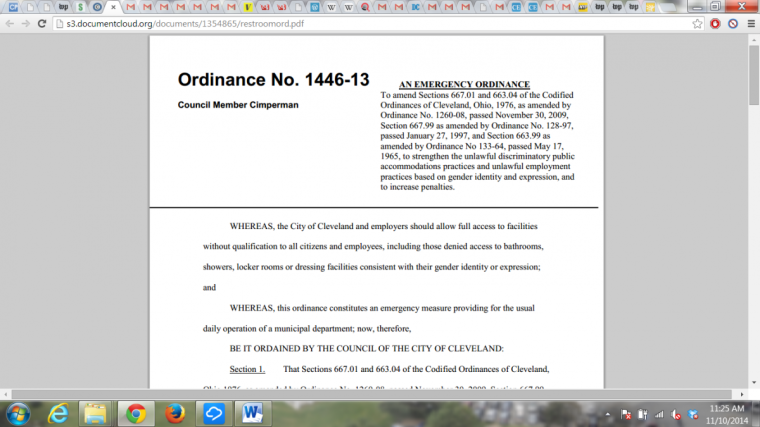Cleveland mulls transgender 'bathroom rights' like those dropped by Houston

CLEVELAND, Ohio (Christian Examiner) – Lebron is back, the Browns share the lead in the A.F.C. North Division and it would seem winning ways are in chic in the rock and roll capital of the world, until now.
Cleveland's mayor and city council are set to mull a 'bathroom bill' giving transsexuals the right to use any public restroom and shower in the city regardless of the person's biological gender. In other words, a man who "feels" like a woman can use the women's restroom whether his physiology matches his internal sense of being or not.
The public outcry in Houston made their mayor -- an open lesbian -- delete such provisions in that city's controversial human rights ordinance. Petitioners also are fighting her denial of more than 50,000 signatures (three times the required number) -- validated by the city secretary -- asking for a city-wide up or down vote on the whole ordinance. That issue is headed for trial in January 2015.
Likewise, in 2012, the pushback by Jacksonville, Fla. voters was so strong against an expansion of LGBT rights that the city council rejected what was presented as an "anti-discrimination" bill by a 17-2 margin.
The Cleveland bill is described by its sponsors as "an emergency measure" to give transsexuals full access "to bathrooms, showers, locker rooms or dressing facilities consistent with their gender identity or expression." The bill does not make accommodations for non-transsexuals whose "expression" might be at odds with the provisions.
Creating confusion is the fact the purpose of Ordinance 1446-13 -- which expands LGBT rights at the expense of the rest of the public -- is listed as "to strengthen the unlawful discriminatory employment accommodations practices and unlawful employment practices based on gender identity and expression, and to increase penalties." Whether the phrase was meant as an "in-your-face" insult to those opposing an expansion of LGBT rights, or a simple drafting error, the bill likely will evince strong public opposition.
Such measures by cities and the federal government have come under fire by a Johns Hopkins University expert.
In a June 12 editorial in the Wall Street Journal, Paul R. McHugh wrote that policy makers and the media "are doing no favors either to the public or the transgendered by treating their confusions as a right in need of defending rather than as a mental disorder that deserves understanding, treatment and prevention."
"'Sex change' is biologically impossible," he said. And he strongly criticized efforts to legalize what he described as the subjective "feeling of gender" that "being in one's mind, cannot be questioned by others."
"The individual often seeks not just society's tolerance of this 'personal truth' but affirmation of it," he wrote. The end result is a demand for "transgender equality" including government payment for medical and surgical treatments, "and for access to all sex-based public roles and privileges."
McHugh, a venerated psychiatrist, researcher and educator, is the University Distinguished Service Professor of Psychiatry at Johns Hopkins University, and served as Psychiatrist-in-Chief at the Johns Hopkins Hospital from 1975–2001.
The Cleveland legislation, sponsored by Councilmen Joe Cimperman and Matt Zone, will be discussed at a Nov. 12 committee meeting, 1:30 p.m. in room 117 at the city hall.
If passed, businesses and other places of public accommodation that do not allow people to use the restroom without respect to gender identity would be guilty of discriminating and face a $1,000 fine, or up to 3 months in jail, or both. Exemptions include businesses with fewer than four persons, religious organizations whose service or membership is limited to a "single religious faith," religious educational institutions, private social or fraternal organizations, and any company where a religious creed is a condition for employment.